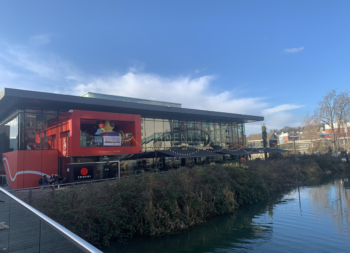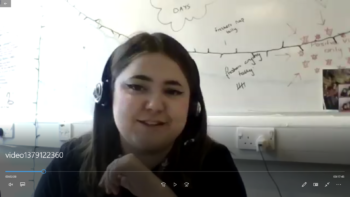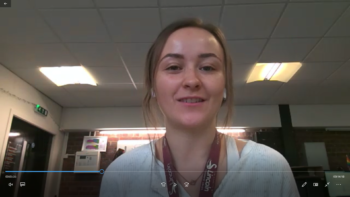“Amina? I mean, she was just amazing at speaking to students, everyone would go to her…students felt comfortable reaching out to her.”
So says Nat Kirchin, the recently voted-in Vice President Campaigns and Environment who was speaking to me about Amina Akugri – the outgoing Vice President International. Amina received glowing praise due to her handling of students’ issues and concerns during the pivotal two years that the Covid pandemic has affected students at the University of Lincoln.

With around 700 international students to help out when they need support, Rita Ugi has now been elected into the role of Vice President International in the recent Student Union elections, but what does the job carry with it and how has Covid affected international students in the past two years?
Nat spoke to me alongside Harriet Kennedy (last year’s Vice President Wellbeing and Community – the position is now held by Zuzanna Romanska). Read on…
So what is the role of the vice president International? What does it entail?
Nat: Vice President International (VPI) works similar to other VP roles in that we’re essentially here to represent and support students’ academic interests, but a lot of time that stems outside of actual academics. A lot of the time it involves helping international students meet each other, forming communities, also getting home students involved in things so that we can help the universities one community ethos that we have. I always say the Vice President International is probably one of the most overarching roles, because while the rest of the VPs have their own remit, VPI looks after all of that for international students, looking after education for international students with the help of Talia, who’s our vice president education, looking after forming communities through societies and sports, and then generally looking after any issues requiring support. It is a very overarching role of essentially supporting and representing international students.

So what has the student union done over the last two years to help international students, with the dramatic events that we all know about unfolding?
Harriet: So we supported international students over what I think we would argue, is probably the two hardest years that the VPI has had to support through, and a lot of national students were able to go home during the pandemic, and a lot of international students didn’t have that option – they were stuck here. That led to issues of isolation and things like that. So Amina supported them amazingly through that and with the work of the SU – we did care packages and food packages for those who were isolating and couldn’t get out, that we would take to the house.
We always try and offer support with accommodation, and Amina led really well on that – working with our advice centre, because they can offer help on anything to do with rent, and landlord disputes, which does come up for a lot of international students. Sometimes because there are those barriers, that help and advice is so, so important. Amina’s done an amazing job leading on that through the International Students Association (ISA) as we’ve been coming out of the pandemic, and you know, a lot of students haven’t had those connections. They didn’t have that chance to build those connections.
How did Amina help organise events for the international community?
Harriet: So, Amina did a fantastic job at facilitating events. She’s done ISA parties, and she always went to the coffee mornings and catch ups for Lincoln International Business School, which is where a high percentage of the international students typically study. So, trying to help them form those connections, because obviously isolation and things like that can cause so many issues. It can both have an adverse effect on the academic side of life as well as an adverse effect on mental health. And so it was important to organise those chances to interact with each other and also, facilitating events such as cultural events.
We had Diwali that we had on in the Engine Shed, which was absolutely amazing. We had so many people attend, and it’s so important for those cultures to be able to celebrate properly: we had the Lunar New Year a few weeks ago. It’s so important for international students to be able to fully celebrate their cultures, celebrations and holidays and dates, as well. Just by being able to facilitate that for them gives them that extra sense of community, and just really links into that one community ethos that we try to have across campus.
Yes, I went to Divali – it was it was really, really good! So how many students contacted the Vice President International, reaching out for support? There must have been COVID-related issues?
Harriet: Amina? I mean, she was just amazing at speaking to students, everyone would go to her – no one would have a problem with going to her and any students felt comfortable reaching out to her. She had a lot of time for students, especially through the pandemic, because of that ‘X-rated’ need for support. And you know, she was just so approachable and so friendly. All the students were always happy to reach out to her – everyone just wanted to speak to Amina – I wanted to speak to her whenever I could! She was just one of those people that you just wanted to meet!

I met her at Diwali, only very briefly – it’s good to hear good things about her! So has the student union changed the way it helps people in the wake of COVID, are there long-standing changes to policy or to your efforts, in the way in which some businesses now do things differently, maybe with pastoral care?
Nat: Probably, I wouldn’t say there’s potentially been a change of policy or anything. But I think we’re now very much more aware of what actually works for students. Obviously, throughout the pandemic, everything went virtual – we still did everything we would do, to the extent we could. So when we would have, for example, International Student Association meetings, they would still be hosted, they would still be online, so that those students still had those feedback mechanisms and could reach out if they needed us. And that is something that we still do.
We’re very, we try to take as much of a hybrid approach as possible. So whenever there’s anything that’s around feedback, or kind of connecting students, we try to do one of each, trying to do something in person and something online to make sure that every student has been reached out to because we’re aware that not all students live in Lincoln, and they still want a community, they still want support. So we do, we do those kinds of things and try and ensure that every student has a chance to kind of connect with us and feedback to us. And that’s something that was brought about through the pandemic and it’s definitely going to stick.
So I think that’s probably the biggest thing that we’ve learned. And that has changed and will probably stay for a number of years now probably.
That’s great. So how were international students helped when they were stuck abroad during lockdown?
Nat: So that was very much the discretion of the university. They were the ones that knew where students were stuck abroad, and needed support, whether like through learning or whatever. So we didn’t really get involved much in that. But again, it goes back to the hybrid approach – if they were stranded somewhere needing support and wanted a community we can still provide them with that. So I wouldn’t say that we had much involved in actually dealing with those students that were stranded abroad but we did help facilitate any kind of reaching out if they needed it or making sure that there were events they could access to make sure that they had a community around them.
So, can students seek help and advice from the from the Vice President International before they start their studies at the Union? And is there a message that you would send out to new or prospective students that need support?
Nat: Definitely. Randomly I took on the international email account when Amina left so that those students still had somewhere to feedback to. I always check it, and there’s always a couple of emails from students who are saying, “Oh, I’m coming over, in this month or that month, what is there available? What can I do?” Sometimes it is very specific information they require, which is always passed on to universities.
But they’re always able to reach out to us, I think we see it more with international students than we do with home students – I very rarely get contacted by students from the UK that are coming to Uni, that often comes when they actually arrive. But a lot of international students, they will reach out as much as possible to make sure everything is ready, and that they know where to go when they get here and that everything is kind of sorted. And that they can kind of just settle in as easy as possible. So we always encourage students to reach out if they need to, whether that’s with specific information, whether that’s just “I want to get involved but I don’t know how? Where can I go when I get here”. And we’re always more than happy to do that and talk about that.
So I read that I think it was Amina was putting the policy of no exams on days of cultural significance. Did that happen?
Nat: I can’t, I’m not 100% sure as to whether it happened. However, what I do know is that where cultural days of significance are involved, for example, Ramadan, students can apply for extensions, extenuating circumstances, and that has become much more lenient, and it’s more taken into consideration than it probably was done before. I think there’s an issue the Uni has with making sure there’s no exams on every cultural day of significance, because there are so many. And that really limits when they can actually do exams, however, they’ve increased the kind of support available to students so that that’s all taken into consideration when they do them, or if they need an extension to do them at a slightly later date. So it’s not so much that there’s a policy of no exams on days of cultural significance, it’s more, there’s more support available for students to ensure that they’ve got everything behind them that they need to do to do as best they can.
Okay, so here’s a sort of extra question. How is the Vice Presidents International going to deal with the Ukraine crisis? Do you do wish to say something on behalf of the Union?
Nat: What we always say is, if there are students who are struggling, please reach out to us. We have reached out to the students that are from Ukraine, but we as much as possible just want to support those students and signpost them to the services that we have and that we believe can help them. But that would never have just been to the discretion of the Vice President International – that is definitely something that the entire executive committee, which is the five VPs plus college officers, would have discussed and decides how we want to kind of go about helping students.

